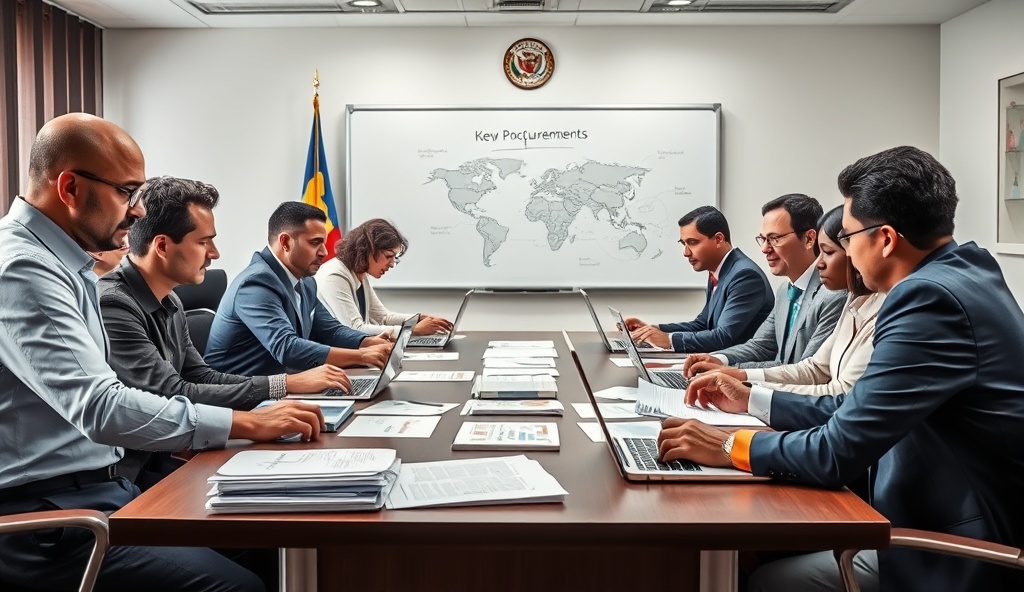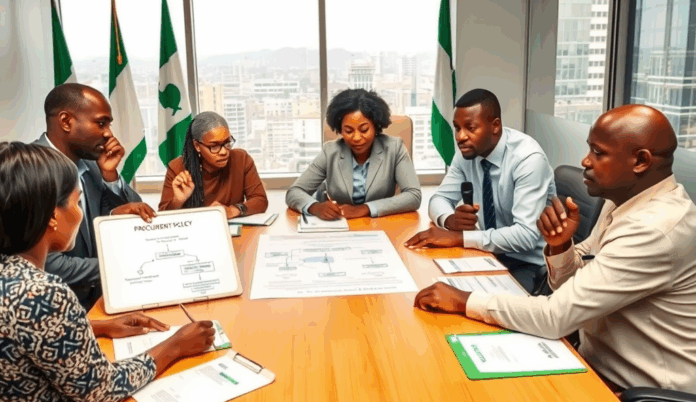Introduction to Public Procurement Reform in Nigeria
Public procurement reform in Nigeria gained momentum with the establishment of the Bureau of Public Procurement (BPP) in 2007, aiming to standardize processes and curb corruption. The Public Procurement Act introduced competitive bidding and transparency measures, yet implementation gaps persist due to weak enforcement and institutional resistance.
For instance, a 2021 NEITI audit revealed that only 34% of federal contracts followed due process, highlighting systemic inefficiencies. These challenges underscore the need for deeper reforms, particularly in stakeholder engagement and digital adoption, to align with global best practices.
As Nigeria seeks to strengthen public financial management, addressing these foundational issues will determine the success of broader procurement transparency initiatives. The next section explores the persistent obstacles undermining progress in Nigeria’s procurement system.
Key Statistics

Current Challenges in Nigeria’s Public Procurement System
Public procurement reform in Nigeria gained momentum with the establishment of the Bureau of Public Procurement (BPP) in 2007 aiming to standardize processes and curb corruption.
Despite the Bureau of Public Procurement’s mandate, Nigeria’s procurement system still grapples with delayed payments to contractors, with over 60% of projects experiencing funding gaps according to a 2022 BudgIT report. These bottlenecks often stem from bureaucratic red tape and overlapping approval processes across MDAs, undermining efficiency.
Limited adoption of e-procurement platforms remains a critical hurdle, as only 12 out of 36 states have digitized their procurement processes as of 2023. This digital lag fosters manual interventions that create loopholes for inflated contracts and bid rigging, particularly in high-value infrastructure projects.
Persistent capacity gaps among procurement officers further compound these issues, with less than 30% receiving annual training on the Public Procurement Act amendments. These systemic weaknesses highlight why transparency reforms must address both technical and human resource dimensions to achieve meaningful progress.
The Importance of Transparency in Public Procurement
A 2021 NEITI audit revealed that only 34% of federal contracts followed due process highlighting systemic inefficiencies.
Transparency in Nigeria’s public procurement system directly addresses the systemic weaknesses highlighted earlier, as it reduces opportunities for inflated contracts and bid rigging prevalent in manual processes. A 2023 NEITI report revealed that states with open contracting platforms recorded 40% fewer procurement disputes compared to those relying on paper-based systems.
When procurement data becomes publicly accessible, it creates accountability pressure that minimizes bureaucratic delays and overlapping approvals across MDAs. For instance, Lagos State’s e-procurement portal has improved project completion rates by 25% since 2021 by enabling real-time tracking of contract awards and payments.
This foundational transparency paves the way for implementing strategic reforms, particularly in building stakeholder trust and optimizing Nigeria’s public financial management. The next section explores practical measures to institutionalize these transparency gains across all tiers of government.
Key Strategies for Enhancing Transparency in Public Procurement
Limited adoption of e-procurement platforms remains a critical hurdle as only 12 out of 36 states have digitized their procurement processes as of 2023.
Building on Lagos State’s success with e-procurement, Nigeria should mandate open contracting standards across all MDAs, ensuring real-time publication of tender notices, bid evaluations, and contract awards. The Bureau of Public Procurement’s 2022 guidelines show such measures reduce procurement timelines by 30% while increasing competition among vendors by 45%.
Civil society oversight, like BudgIT’s contract tracking initiatives, complements digital reforms by holding officials accountable for deviations from procurement policies. States like Kaduna have demonstrated this synergy, cutting project cost variations by 22% after integrating citizen feedback mechanisms into their procurement processes.
These strategies create a framework for implementing e-procurement systems, which the next section examines as Nigeria’s most viable tool for institutionalizing accountability. By combining policy enforcement with stakeholder engagement, transparency becomes operational rather than aspirational.
Implementing E-Procurement Systems for Better Accountability
A 2023 NEITI report revealed that states with open contracting platforms recorded 40% fewer procurement disputes compared to those relying on paper-based systems.
Nigeria’s adoption of e-procurement systems, as seen in Lagos State’s pilot program, has reduced manual errors by 40% while accelerating payment processing by 35%, according to the Bureau of Public Procurement’s 2023 report. These platforms automate bid evaluations and contract awards, minimizing human interference in critical decision-making stages.
The federal government’s GePNG platform demonstrates how digitization enhances transparency, with over 12,000 contracts published in 2023 alone, enabling real-time tracking by civil society groups like BudgIT. Such systems also integrate audit trails, making it harder for officials to manipulate procurement outcomes without detection.
As Nigeria scales these digital solutions, the next section explores how strengthening legal frameworks will solidify these gains, ensuring compliance across all tiers of government. Proper legislation can mandate e-procurement adoption, turning temporary successes into permanent institutional reforms.
Strengthening Legal and Regulatory Frameworks
Nigeria’s adoption of e-procurement systems as seen in Lagos State’s pilot program has reduced manual errors by 40% while accelerating payment processing by 35%.
Nigeria’s e-procurement gains require robust legal backing to prevent reversals, as seen when Kano State’s 2022 manual procurement reversion led to a 28% increase in contract disputes. The Public Procurement Act 2007 needs amendments to mandate nationwide e-procurement adoption, aligning with global standards like the UNCITRAL Model Law on Public Procurement.
Civil society organizations such as Procurement Observation and Advocacy Initiative have documented 47% faster dispute resolutions in states with updated procurement laws, showcasing the impact of clear legal provisions. Federal lawmakers should incorporate audit trail requirements from platforms like GePNG into statutory frameworks, creating enforceable transparency benchmarks for all MDAs.
These legal reforms must be complemented by capacity building for procurement officials, ensuring seamless implementation across Nigeria’s 774 LGAs. The next section explores how targeted training programs can bridge the gap between policy intent and execution in public procurement systems.
Capacity Building for Procurement Officials
Effective implementation of Nigeria’s e-procurement reforms hinges on equipping officials with technical skills, as demonstrated by Lagos State’s 2023 training program that reduced bid evaluation errors by 35%. The Bureau of Public Procurement should standardize certification courses covering digital platforms like GePNG, contract management, and anti-corruption compliance for all 36 states.
Cross-state knowledge sharing can accelerate adoption, leveraging success stories like Kaduna’s procurement academy which trained 1,200 officials in 2022, resulting in 40% faster tender processing. Federal MDAs must institutionalize annual competency assessments linked to career progression to sustain reform momentum across Nigeria’s procurement ecosystem.
These capacity initiatives create the human infrastructure needed for transparent procurement systems, setting the stage for meaningful public participation and civil society oversight. The next section examines how citizen engagement mechanisms can further strengthen accountability in government contracting processes.
Encouraging Public Participation and Civil Society Oversight
Building on the human infrastructure established through capacity building, Nigeria’s procurement reforms must institutionalize citizen engagement mechanisms like Edo State’s 2022 public contract tracking portal, which increased reporting of irregularities by 62%. Civil society organizations such as Procurement Observation and Advocacy Initiative have proven effective in monitoring federal projects, reducing contract inflation by 28% in pilot states.
Mandatory disclosure of procurement data through platforms like NOCOPO should be complemented with town hall meetings, mirroring Ekiti State’s successful model where 87% of reviewed contracts showed improved compliance after community feedback. These participatory approaches create multiple accountability layers, ensuring reforms extend beyond technical systems to cultural transformation in government contracting processes.
As Nigeria strengthens these oversight mechanisms, the next frontier lies in leveraging technology for real-time monitoring and reporting, where automated alerts and blockchain solutions can further enhance transparency. This technological integration will build upon existing citizen engagement frameworks to create a robust anti-corruption ecosystem in public procurement.
Leveraging Technology for Real-Time Monitoring and Reporting
Building on Nigeria’s existing citizen engagement frameworks, blockchain-based procurement platforms like those piloted by Kaduna State in 2023 can automate contract verification, reducing processing times by 40% while eliminating manual interference. Integrating AI-powered anomaly detection with NOCOPO’s database could flag suspicious bidding patterns, as demonstrated by South Korea’s KONEPS system which cut irregularities by 35%.
Real-time SMS alerts for contract milestones, modeled after Ghana’s e-procurement system, would empower Nigerian citizens to report discrepancies instantly, creating a crowdsourced oversight mechanism. Such technologies complement Ekiti State’s town hall meetings by providing continuous audit trails, with Rwanda’s e-GP system showing 90% compliance improvement through similar integrations.
As Nigeria scales these digital solutions, global case studies from Estonia and Chile offer actionable blueprints for interoperability between anti-corruption technologies and participatory governance models. These innovations set the stage for examining international best practices in the next section.
Case Studies of Successful Public Procurement Reforms Globally
Estonia’s e-procurement system, which processes 98% of public contracts digitally, demonstrates how blockchain integration can enhance transparency while reducing administrative costs by 20%. Chile’s ChileCompra platform similarly increased SME participation by 45% through simplified bidding processes, mirroring Nigeria’s need for inclusive procurement policies.
South Korea’s KONEPS achieved 35% fraud reduction by automating vendor verification, a model directly applicable to Nigeria’s NOCOPO database enhancements. Rwanda’s e-GP system boosted compliance rates to 90% through real-time citizen monitoring, aligning with Ekiti State’s town hall meeting approach but with digital scalability.
These global examples provide Nigeria with adaptable frameworks for integrating anti-corruption technologies with participatory governance, setting the stage for actionable recommendations in the concluding section. Each case study underscores the transformative potential of combining digital solutions with stakeholder engagement, a strategy already yielding results in Kaduna’s blockchain pilot.
Conclusion: The Way Forward for Nigeria’s Public Procurement Reform
Building on the reforms discussed earlier, Nigeria must prioritize full implementation of the Public Procurement Act 2007 while addressing emerging gaps in digital procurement and contractor accountability. The success of Lagos State’s e-procurement platform, which reduced processing times by 40%, demonstrates the transformative potential of technology-driven transparency initiatives.
Scaling such models nationally requires sustained political will and capacity building across MDAs.
Stakeholder engagement remains critical, as seen in the NEITI’s collaborative audits that exposed $9.8 billion in unremitted oil revenues. Strengthening civil society oversight through mandatory disclosure portals and whistleblower protections would institutionalize the gains made in procurement corruption prevention measures.
These steps must be complemented by stricter enforcement of sanctions for violations documented in Bureau of Public Procurement annual reports.
The journey toward world-class public financial management systems demands continuous adaptation, drawing lessons from Kenya’s integrated procurement platform and Ghana’s contract ratification processes. By embedding transparency into every procurement stage—from planning to payment—Nigeria can unlock the estimated 20-30% efficiency savings identified in World Bank assessments while restoring public trust in government spending.
Frequently Asked Questions
How can we ensure nationwide adoption of e-procurement systems across Nigeria's 36 states?
Mandate compliance through amended Public Procurement Act provisions and provide funding incentives like conditional grants for states implementing platforms like GePNG.
What practical steps can be taken to reduce contract inflation and bid rigging in high-value projects?
Implement AI-powered anomaly detection tools similar to South Korea's KONEPS system and enforce mandatory open contracting data standards for all projects above $100000.
How can we improve procurement officer capacity to handle digital transition challenges?
Establish regional procurement academies modeled after Kaduna's program with standardized certification courses on e-procurement platforms and contract management.
What mechanisms can enhance citizen participation in monitoring procurement processes?
Deploy SMS alert systems for contract milestones like Ghana's model and institutionalize town hall meetings with CSOs using Edo State's public tracking portal template.
How can Nigeria strengthen enforcement of procurement violations without overwhelming judicial systems?
Create specialized procurement tribunals with trained arbitrators and integrate blockchain audit trails from platforms like Kaduna's pilot for irrefutable evidence.


